Reviews from Graduates of the Department of Marketing and Business Administration (in the past, the Department of Management and Mathematical Modeling of Market Processes), “Management” Specialty

Anna Shevchuk. Travel industry
Odessa National University – it is the status; to study here – it is the chance; to study well – it is the pride.
I am very pleased with educational process; its quality bears fruit. I work in a travel agency, and all knowledge, which I got, is very useful. There was not such as people usually say: "Forget everything you learned at the university." Knowledge base and skills easily allowed me to enter the work schedule and quickly become a professional of the field.
There were a lot of emotions from the charm and ease of student life, especially KVN evenings and days of faculty. Memory remained for many years. About the university can say: "good, but not enough!", because the awareness that learning is good does not come immediately, but somewhere to the third year of studying, when you decide about goals and aspirations in life. And if the awareness comes, learning becomes a joy, books are in help and a diploma is in favor.
And I'm really proud of, that I met friends for whole life at university.

Sharoiko Alina. Own consulting firm in Milan
After our university I graduated from university in Milan (Istituto Marangoni). During educational process I realized how good base I got at the Department of Management and Mathematical Modeling of Market Processes at IMEM ONU. My fellow students with the similar education got in London, New York or elsewhere, just know the quarter of the information that I possessed. In my case, more specialization, which I was looking for, laid well on a solid foundation.
However, do not forget that you cannot be taught – you can only learn. Knowledge that can be get on our faculty is really very qualitative, even compared to international education, but it is only a tool, albeit a very good one. Without the flexibility of thinking, so-called "inquiring mind", makings of a leader and desire to break out of the gray mass, even the best business education is meaningless. Therefore, go ahead and you will succeed!

Andrey Fedotov. PhStudent of the Department of Management and Mathematical Modeling of Market Processes, IMEM, ONU
I am very glad that I entered exactly this specialty, specialty "Business Management" and the fact that I have been taught by this teaching staff. I think not every student can boast such recognition after the release. Probably the most important thing I have learned over the last five years is adequately and rationally look at things, to understand the economic reality in which we live and the value of each word thrown in the business. Whoever you will be in the future, management is a serious reliance in your identity of life and building your professional career.

Lydia Bogdanovich. The Head of the design department of the company Provectus IT (http://www.provectus-it.com/)
Eternally grateful to the university for the studentship and the experience that I have received over the 5 years.
In my experience, who wants to learn – learns, and the others criticize the educational system. I think for future entrants will be interesting to read about the skills that you can get during studying on "Business Management and Administration" at IMEM, and that will help them in life. So, the skills that I received:
• Ability to learn
First what you study at university is a skill to learn. And experience shows that in life without this skill you cannot exist. I work in IT sphere. It is very dynamic, technology and requirements change very quickly, we must be able to adapt quickly and learn large volumes of data. There you cannot write off or hach. Here, as it is said, you are in or out.
• Public Speaking
Student conferences, presentations, reports, KVN (especially KVN) have taught not to be afraid of speaking to any audience. If you are dancing with feathers in front of the two thousandth audience, then you have nothing to fear, whether it is foreign customers, international conferences and corporate events. With the ability to clearly, correctly and most importantly interesting to present your thought you will not be lost. Of course, it all depends on your goals and priorities. If you plan to be a leader – without this skill you cannot be.
• Analytical skills
"Our target audience is men and women from 15 to 75 years"
During the studying process we performed a lot of work on the analysis of the enterprises, market, target audience, etc. At my current job I faced with this every day. Basic skills in business analytics help you to understand better the customer's business, the needs of his audience and as a result, get the better product at the exit than the competitors, who focus only on their own experience in the design of the product.
• Team work and the ability to teach
"People are not very good, but the staff is great"
While studying at the university, we are inevitably in the team. And we are already at the age when the successful cooperation can be the key to success.
My department consists of 5 people. Some are working with me in the office, the other are working remotely in other countries. My job as a leader is to form a close-knit team that can work efficiently, quickly learn and grow professionally. Group tasks at the university, in my opinion, prepare us for the basics of that skill. In addition there are common problems and challenges. And you inevitably come to the conclusion that sharing material and preparation of cribs all the department is more efficiently than one is writing them during sleepless nights.
• Planning, organization, motivation and control
I never would have believed it, but this is what I'm working on. I plan projects and employment of my staff, assign duties and delegate authority. I organize the work of my department, introduce a system of training, motivate (although it is more difficult than in theory, a very delicate moment) and control the work. This is how to know that Santa Claus exists. Very unexpected, but it's nice =)
• Business Planning
"Conclusion: the inevitable increase of profit by 10-15%"
A single word I would like to say about the business plans. During the studying we have repeatedly done various types of business planning. Now, in my current position, I am on the other side. I often have to read and analyze business plans written by other "experts." And then, with tears in the eyes, we remember the studentship. Unfortunately, very often the source data, analysis and conclusions are unrealistic and often do not have practical use.
• Theory vs. practice"
“This theory only works for spherical chickens in a vacuum”
Great thanks to our teaching staff for giving us the minimum of theory and maximum of practical skills. I cannot vouch for the adjacent specialties. But the practical skills got at my department were useful for me in a million times more than dry theory, which similar specialties teach their students. I would like to thank the teaching staff of my department for the knowledge base that I received after graduation; I will always fondly remember the 35th audience and rag on the chandelier. It was fun.

Tatiana Kozovaya. IT - business
I graduated from the university in 2010, specialty "Business Management" at IMEM, ONU. By a lucky chance I started to work early after the second year of studying, when the practice was held in one of banks in Odessa. To date, my official work experience is 6 years.
At the moment I am a PR-manager of International R&D Company Provectus IT, which is engaged in software development. My duties include developing of the marketing strategy, the organization of conferences, writing news and information articles, media relations, information support of the corporate website, preparation of corporate presentations and other marketing materials.
At university I got the basic knowledge. University allowed to combine studying with work (I could analyze received theoretical information with practical examples). Studying such subjects as strategic marketing, advertising, management and mathematical disciplines especially helped me in my work.
I am eternally grateful to my teaching staff!

Yulia Janova. Freelancer.
Education in the field of management has given me an understanding of how the organization works, what role the structure has in the company's activities and from which parts of this circuit is built. The main thing is not know everything about all aspects of the company, it is more important to understand where and why there is a problem and what to do to solve it.
I was taught at the faculty: "All in good time!" The time is here and now, and then it may not be. You cannot allow yourself even a little laziness on the work. All that you take is worth doing to the maximum of your capabilities, even if at the moment this work does not give you personal motivation. When you will be able to get a higher position, you can just simply do not fit her.
You as a specialist, your time and the work you do have a price, and do not be afraid to designate it. Anyone who needs a result of your work will pay for it. And the main thing to remember – knowledge is money, and the extra money does not happen. Therefore draw conclusions!

Vadim Rogowskiy. «Founder at Clickky and partner in WannaBiz invest-fund (IT-technologies).»
What am I doing at the moment? I am the CEO of the company- developer of projects such as Clickky and AdCenter, as well as the managing partner of a start-up incubator WannaBiz.
The specialty "Business Management" gave me: first of all useful knowledge in marketing, management and strategic planning, and of course – valuable acquaintance with excellent teaching staff, which, I am sure, will continue to be useful to me in the future.
Regards, Vadim RogowskiyRegards, Vadim Rogowskiy

Yulia Karpova. Air transport
I graduated from the university in 2012, specialty "Business Management" at IMEM, ONU.
Education on "Business Management" provides an opportunity to have a potentially wide range of vacancies for a job, because the knowledge gained can be applied in any field of activity. I chose the airline industry. At the moment I am working for a large company «Senturia», which is offering reservation services and ticket sales online, at the position of VIP-manager for personal customer service, and in addition I am a trainer in the education of new employees. In my opinion, the university education allows each student to lay in his future career a solid foundation of knowledge and practical skills. With 5-year studying of management, I not only gained theoretical knowledge, but also learned the important practical issues that apply not only in work but also in life. Skills in organizing the activities of the team, negotiating effectively, result-oriented, planning and development of new projects, search for information, the efficient allocation of resources, and more. All these you can get on the specialty "Business Management" and successfully apply in their future practice.
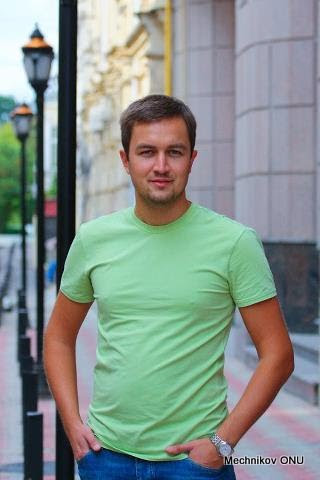
Vladimir Polonik. IT - business.
Business analyst at Netpeak Company.
2005-2010 – studying on the specialty "Business Management". Here I learned how to learn. It means that I was not given a portion of the outdated knowledge. The teaching staff developed skills in me, which always and everywhere allows finding the necessary and relevant information. Not only to find, but also use effectively. And, of course, "the planning, organization, motivation and control :)".

Anastasiya Gordusenko. Container transport.
I am working in freight forwarding company "Sea Gate Agency" at the position of manager in container shipping and freight forwarding / operational manager. Due to university studying, and therefore the Department of Management and Mathematical Modeling of Market Processes, I firstly learned to find independently the necessary information. This does not mean that we have been little taught, but it was shown how using the basic knowledge to expand your horizons and move in the right informational direction.
Whereas the teaching staff in most subjects illustrated the practical application of knowledge, in the future I easily used obtained information in work and in life.
In addition, I am very grateful to the teaching staff for the loyalty and understanding of those students who wish to study and work simultaneously and well :) Since the third year of studying I have begun working in the field of freight forwarding (at the same time visiting all the lectures of compulsory subjects and almost always on time passing modules, tests and exams) and after the graduation I was a ready specialist in the position, which was interesting to me.
An important point in the development of our creative abilities was support of our KVN initiatives by the teaching staff and administration. It was nice to see the people on the performance of our KVN team, who, in theory, should be against students that spend time on such activities instead of studying :)
In general, the attitude to the department and the memories about university studies are good. Thank you that you have moved us in the right direction.
Sincerely yours, Anastasiya Gordusenko

Anna Kovalenko. Tourist industry.
I am working at the position of the manager of communication technologies at the Tourist Information Centre under Administration of Culture and Tourism in Odessa. At the moment I am using knowledge of management, marketing, statistics, and even basics of tourism guide in practice (never thought, my greetings and thanks to Marina Andreevna Kirilina, Veronika Valer’evna Shmagina, Yuriy Vladimirovich Robul, Lyudmila Nikolaevna Zalyubinskaya). I want to say a special thank for the in-depth study of computer science at our faculty, all this is very helpful in my work.

Gorgol Elena, Senior Engineer (economist) of the Department of Economic and Contract Work of Odessa Regional Structural Unit of State Enterprise Air Traffic Control in Ukraine
I have graduated in 2005, and during seven years I have not doubted about the selection of faculty. I remember that after the passing of the last session I thought where it all use, half of the subjects seemed to me absolutely unnecessary. However, in the working process I often recalled with gratitude the teaching staff that was strict and required perfect knowledge of subjects and forbiddance of crib sheets! Micro-and macroeconomics, management, marketing, accounting, all these subjects were handy. Even the statistics!, with which I had hoped never to encounter after graduation, was useful in my job in the first year:) We had the excellent teaching staff and the students were the best! Thank you!

Evelina Khmelevskaya. Advertising business.
I studied at Odessa National University named after I.I. Mechnikov at the Department of Management and Mathematical Modeling of Market Processes from 2000 to 2005. Work experience after graduation allows me to say with confidence that I have received quality education, which gave me the opportunity to work according my specialty. Immediately after graduation: I worked at the marketing department of a hotel complex of luxury class, then in marketing sphere of automobile sector (up to 2012 I was working as the marketing manager for an international holding company – importer of Volkswagen and Audi in Ukraine). And the skills got from the company management were largely useful for starting my own advertising agency at the national level, which for now exists one and a half years and already has a large pool of customers in different spheres.
I would like to thank the teaching staff of the department for that extensive basic knowledge of management and marketing, which they give their students, as well as the opportunity to develop leadership skills, analytical skills and strategic thinking.
 Alla Vavilova, project coordinator.
Alla Vavilova, project coordinator.
Club of high music. Odessa, Ukraine (http://www.kuznetsov.od.ua/kvm/about/)
I want to thank all the teaching staff for the interesting, and most importantly an effective approach to teaching students: relevant and real information from business, economics and management, "live" examples of companies and intelligent cases.
What does make us different from others? We first of all are active and therefore successful, able to manage our time, and most importantly – set real goals and achieve them.
Sincerely,Alla Vavilova
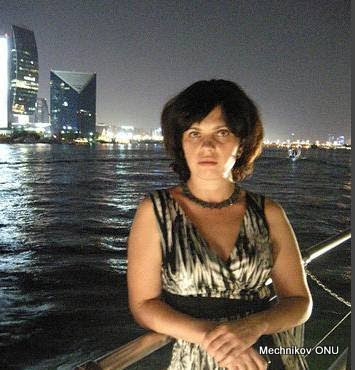
Elena Mirza - tourism.
Graduate of 1999
We – are the first graduates!
It was something brand new, both for students and for teachers. Many disciplines were formed and finalized just during the learning process.
Can it be a reason to think that we did not get a good education or didn’t learn something in appropriate way? Hardly.
For us, who left the school only yesterday, it way pretty difficult to understand what to expect from our future profession. Moreover so innovative discipline for that time as "Management" included a lot of really interesting subjects, especially the ones that were taught as close to practice as possible, some of them were: Hotel industry, Excursion and tourism.
We had a good group, friendly ... Together with our professors we took part in the tourism trade show, which took place in the theater of musical comedy. We used to develop tours in the city for our fellow students and guide them, at first we were embarrassed because people on streets paid attention to us. Some students had their summer internship as the reception in the Turkish hotels, some in travel companies, some people chose different fields of activity.
We still remain in close relationship with a lot of my classmates, some of them are as close as relatives now.
My path led me to the tourism field, and I think that in many ways I owe my teachers and fellow students.
I think this is my specialty, and I made the right choice!
I was going to enter the biology department first, by the way! :)))

Vitaly Dets. Artist, owner of an art studio.
ONU. Mechnikov - Graduation year 2003
I am an artist, the owner of an art studio, where I provide educational master classes.
I want to express my sincere gratitude to my department which I’ve graduated. I would also like to note an excellent selection of classmates. The majority of them are really very talented.
I liked the atmosphere of the learning process, which is very similar to training in the University of Berlin. In the classroom teachers relied not only on theory but also on some particular examples of real situations, which they had experienced by themselves in every field. Still remember the way students could influence the educational program by their wishes and preferences. Teachers and headmasters were trying to be sensitive to all the feedbacks from students and changed any part of the training program.
In this atmosphere, there was a constant creative development! I know that now most of my classmates are either business owners or having responsible positions in business sphere. One can see there has to be something special about the professors and programs they suggest their students that such interesting people chose this faculty and grew up in real business people.
Thank you for the excellent faculty inspiring environment in which every student and every teacher communicate with each other openly and with interest, without fear or constraint.

Irina Radeva, ideologist of CORNER concept store. Store manager
Olesya Tsipii, director of network of multi-brand boutique clothing for children
Elina Caravan, Assistant to the Chairman of the Information and analysis in the social organization
Graduates 2009
If to talk about the amount of knowledge, which was given us during our education, then might repeat a lot of good words that our fellow students have already written. So I would like to pay attention to those people who made our ex-students really prepared and successful professionals. Our Department has a lot of great teachers. But we would like to single out those people who are the heart of the faculty and directly affected our professional success.
Zalyubinskaya Lyudmila Nikolaevna- strength of character, and her validity has convinced us that great things can be achieved only through the diligence and zeal. She made us understand that we have to rely only on ourselves, and as long as we do not realize it - none of us will work out. Only after we began study really hard, we discover the genuine relationship between this teacher and students. We began to appreciate any time we spent with the professor, because she not only taught us as a teacher but was a mentor for us, providing some really good advices.
Grinchenko Yuri Leonidovich – we’d like to mention his loyalty to students and creative non-standard teaching methods. If only you could experience those homework on the analysis of large enterprises in Ukraine! We’ll never forget the practical lessons, when Y.L. came into the audience with an intriguing facial expression and undisguised smile - we knew something interesting is to happen ... And here we see a great package with a 5-penny for the game in exchange! Believe me, these lessons are so fast going and fun, that when they were over, we were really upset. But, the mood after such lessons was great for the rest of the day!
Shmagina Veronica Valerievna - in addition to all the knowledge in the field of strategic marketing, tourism, through her practical trainings we have learned the best way how to treat the audience, how to express our ideas in a proper way, how to think analytically and to respond quickly to any stressful situations. For many of us she was a perfect example. Praise of this teacher was more valuable than any mark we could receive! Thanks to her, we realized that the labor market goods are: intelligence, knowledge, abilities, skills, experience, and all of this come at a price. It is really important to remember that depending on how you would present yourself you’ll be examined accordingly by your potential employer.
Well, of course, we could not forget to mention the younger generation of our fellow teachers - Gaivoronskaya Inna Vitalievna and Nechitailova Nelly Sergeivna. Their lessons differed by new methods and a fresh look at the training process. These teachers were always open to communication and we have never hesitated to ask them something once again or to come to the consultation. Once, I remember a consultation about a course paper lasted until 10 pm – it was a real brainstorm!
We still do not understand how our teachers did it so that was a shame not to prepare for their lessons.
And it is really something to be proud about not for everyone!

Balan Victoria. The family business.
Graduate of 2012
When I was entering the university, in my mind I already had ideas about the possibilities of starting a business, that's why I chose the specialty of Business Management and Administration. After all, for success full business, you must first learn how to plan, motivate, organize, and control all the processes. Excellent teachers are very patient and kind to us, they were trying to put the most necessary knowledge in our head. Nice to remember the times. Friendly, kind, funny and sympathetic teachers will always find a moment to explain something if you are interested.
In Mechnikov I gained friends, not only among fellow students but among teachers as well. I'm sure that no matter how much time has passed, I can always ask for help and they will gladly help us.
At this stage of life, I’m in my father's business with a desire to develop and adopt it in the future. We are engaged in horticulture and we supply our plants in many garden centers of Odessa. In the future, I’m planning to open another branch of the nurseries. Business plan for that one I’ve developed while being at university, in the form of qualifying paper work. I want to thank my supervisor, who helped me, and controlled at every stage. I do understand that after a while I have to change some data in it, but having done it once, I can do it again and again.
IMEM is really a worthy institution of higher education, I am thankful for the fact that I had the opportunity to gain knowledge there, to meet such wonderful people and with all that along I still had a great fun.

Kseniya Strelets. Movie industry.
Graduate of 2010
My four years in the walls of the Mechnikov university were not just dedicated to receiving the higher education (bachelor's degree), but also the acquisition of experience with absolutely different people, with a new language for me and the country, and much more. Professors of our faculty and fellow students helped me a lot with this.
Regarding the education itself, I can say the following: as much as you want to receive in the university, only as much you can get. The teachers are extremely responsible and try to invest in theirs students the maximum knowledge. I also want to note that the education is very diversified, which helps students to develop widely, not only in management, but also to become more acknowledged in matters of business ethics, global economics, psychology and much more. I can surely say that my Bachelor degree in the department of management and mathematical modeling of market processes, has an excellent foundation for my current Masters study in Academy of Art University, San Francisco, USA on a filmmaking specialty (producing and management in the industry) a lot related to the specialty management of organizations.
And also I wanted to say a special thank you to the teachers who gladly and willingly keep in touch with us, former students, being interested in our success and support in our start ups. For me personally, the recommendation later received from the university, helped a lot to enter my master studies and at work.
I can only wish you further improvement and interesting, promising students!
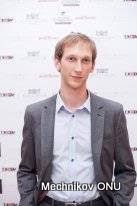
Chernoruchko Denis Vasilievitch
«Head of Analytic Department at Ferarri Park (Abu Dabi, UАЕ) Former – Head of Front-office Department at Wellnes Spa Formula (Odesa, Ukraine)»
Graduate of 2011.
Choosing a specialty and a college after high school, in most cases, consciously or unconsciously, we are being led by our parents. Parents almost always know what is the best for us.
Entering the specialty "Management of organizations and management" in IMEM - turned out to be not just a good, but an excellent choice.
The received here package of knowledge will be valuable, not only at work, but simply in life. Here we found hundreds of acquaintances, many of which turned into a friendship, some in strong collaboration.
Warm atmosphere of the department and the people who created it - our professionals, our teachers.
Thank you all for 5 years of great moments and a huge package of knowledge. =)
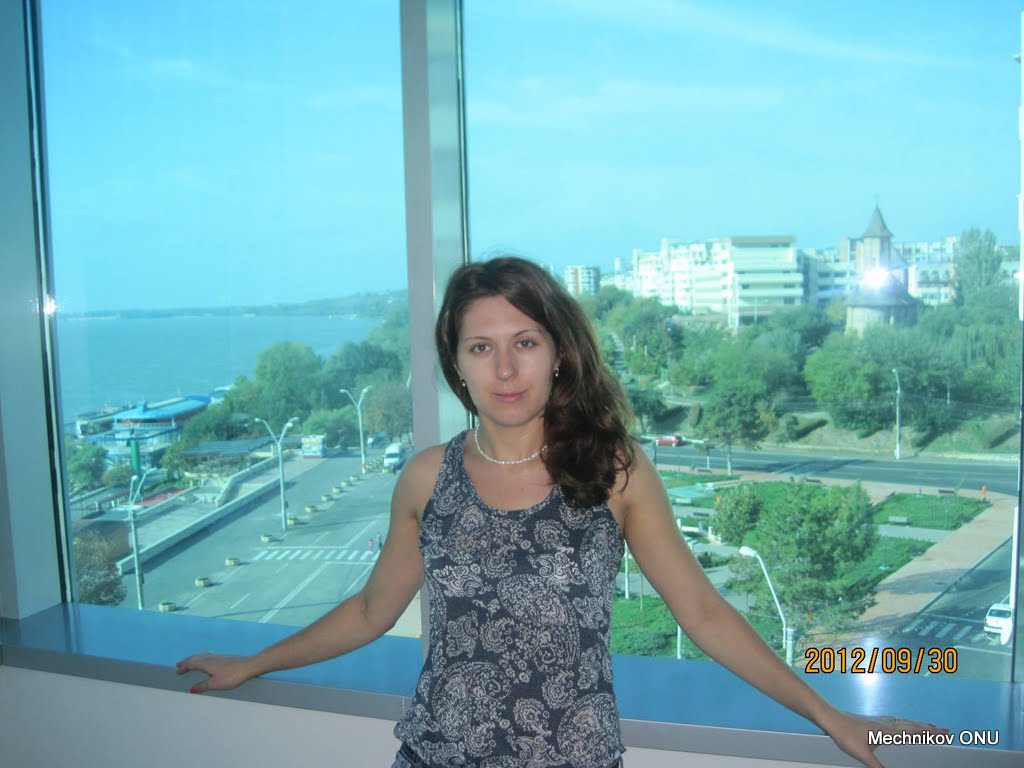
Baptidanova (Konovorotskaya) Valeria.
Manager of IT-advertising LLC "MIRS"
Graduate of 2006
Field of my responsibilities: the development, testing and implementation of marketing programs, preparation and processing of advertising campaigns, site development and Promotion Company.
Now, about my education at IMEM ONU, at the Department of Management and mathematical modeling of market processes. Qualified professors always created a friendly atmosphere in the classroom, which made it easy to understand all of the material during the lessons. The introduction of teamwork during our seminar activities helped to define the roles in the team, to identify personal leadership and management skills . Classes schedule and intensive training programs perfectly fit the student's way of life, gives possibility to participate actively in the life of IMEM, educational and recreational activities.
All knowledge and skills were useful in my early career, and moreover allowed me to try out different activities and to choose the most attractive to me. I still have warm memories of those student days and moments of learning, I’m having plans in future to continue my education within the walls of my dear department.
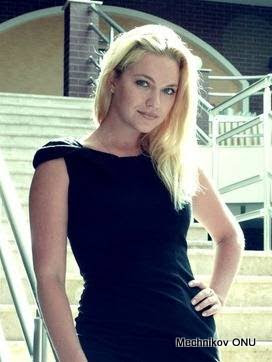
Julia Markush.
The hotel business.
My name is Julia. I graduated ONU IMEM specialty "Business Management and Administration" in 2012.
Five years of study, unfortunately, passed very quickly. Our wonderful teachers have developed in us different professional skills, sharing with us the best of their knowledge, experience and practical skills that help us all to build a career and helped us in everyday life. Over the years I grew up in a new person, learned how to understand life better, and they taught me how to communicate on a business level.
Many people ask about what the university can teach us. At work they will teach! It is not correct. Many of knowledge in the field of tourism, management, higher mathematics, statistics, economics, marketing, and English were really useful for me. Already starting from my second year and for three years, I was an intern at the "Black Sea" hotel in the reservation department. The practice has helped me to learn the hospitality industry from the inside and understand that the hotel business - is something to be called "mine."
Immediately after graduation, I was accepted to work in a brand new hotel "California", which opened in Odessa on August 2012. I’ve been working as a hotel administrator for the past 7 months, and due to the knowledge and skills that I have gained during my studies at the university, I have become such a successful and respected employee!
P.S. Thanks, ONU, I mess you a lot!!

Olesya Grosu, a graduate of 2011
Travel agency «TUI». Tourism manager.
I graduated from ONU of I.I. Mechnikov, specialty "Management of organizations," and I can confidently say that thanks to education, which I received here I got all the reference knowledge needed in my current career.
Now, after a while I realize that the fears were redundant. Most of us found ourselves in those areas in which we dremt to work, because it is our department provided us with a variety of opportunities for self-realization.
Comprehensive development is very important in today's world. Now people can not solve modern problems without having all the necessary knowledge in many areas of science.
In my opinion the educational program developed by teachers of the Department of Management of Organization is unique. It contains not only a lot of very interesting and useful specialized courses, but also provides students with basic knowledge in various areas of management - strategic and operational management, financial management, marketing management, human resource management, IT-technologies in management and of course tourism.
You will learn to think analytically and strategically, solve problems of state regulation of the economy and to take responsibility for those decisions.
In addition, the department provides students with many opportunities for the development of creative and organizational skills: this is the opportunity to participate in contests and all kinds of projects, business games, conferences, seminars, guest lectures, as well as the opportunity to participate in the organization of various events. All this allows students to improve different knowledge, skills and abilities. Public speaking, writing and presentation of their research projects - this is not a complete list of things which will help you to feel confident in the future.
Now I’m working in a travel agency «TUI», which is Europe's largest tour operator. The TUI company is the leader in the European tourist market. In Ukraine, it is represented by "TUI Ukraine". A lot of stuff I went through at the university is now being used in my favorite work.
With warmth and gratitude I recall my favorite department and the professors.
Recommend - enter IMEM the specialty "Management of organization and administration", and believe me, you will have a much better chance to succeed in life!
Karina Maky
Middle QA Engineer at Reinvently (Provectus Mobile studio)
Former - Business process operator at PLS (Pitsburg Logistic Servises)
Former - Support manager at KeepSolid Іnc.
To the question: "What gave you the university" is very common we hear the answer, "Everything." For my part I’d like to notice, that it's all always have been. Department of Management, in my case, has played a catalytic role. The highlight, for me, was the radical difference in regarding from teachers to their students. That’s all, school ended and the totalitarian regime too. Here there are the respect you for your views and outlook. Here the beginnings of the ideological germs can find a real basis for implementation.
In addition to the foregoing, I’d like to note one more important point: the flow of information. I did not intend to write "knowledge" because everyone is free to choose what kind of information he wants to transfer to his specialized knowledge. I do not want to confuse, because it is necessary to teach and pass all exams, but because of its vastness, become a pro in everything - not become anything. Therefore, returning to the stream: one man repeatedly in life is faced with the problem of self-realization and choice of occupation / profession in spirit and disposition. So, a lot to choose from when your learning is rather small? Department of Management, even if it sounds very metaphorically, helps you to rub your eyes after such a measured deep slumber, look around and at least think about it. I didn’t know about many trails for further development, but when all the cards are opened before you, and the coolest - make you think, - this is the moment when you feel that there is little in this world is such that you can not do.»

















 Alla Vavilova, project coordinator.
Alla Vavilova, project coordinator.





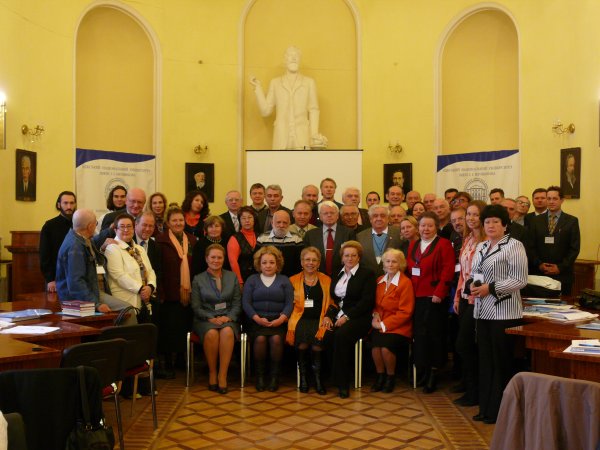
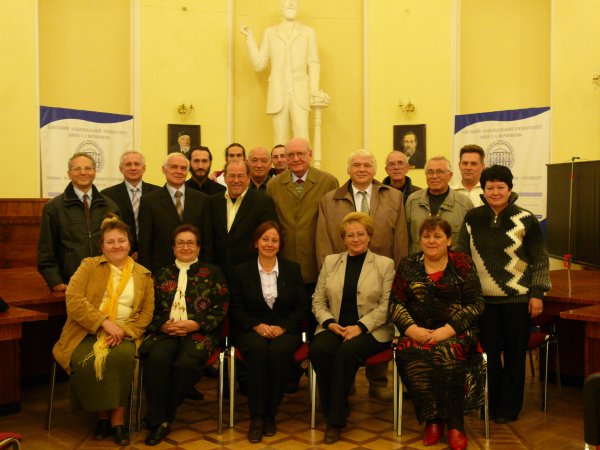
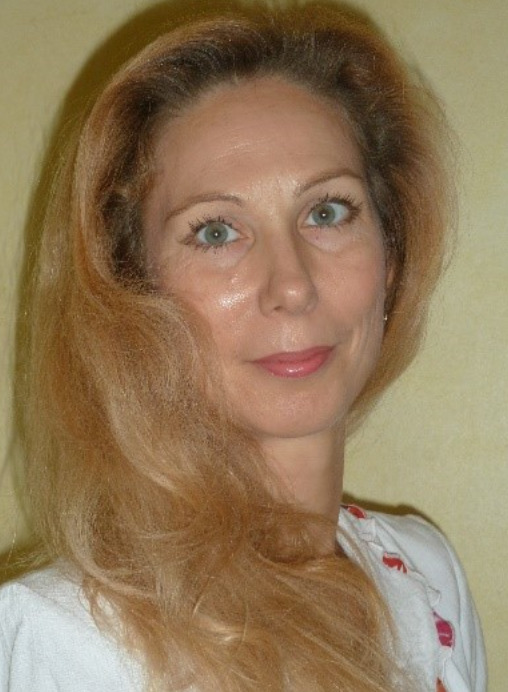

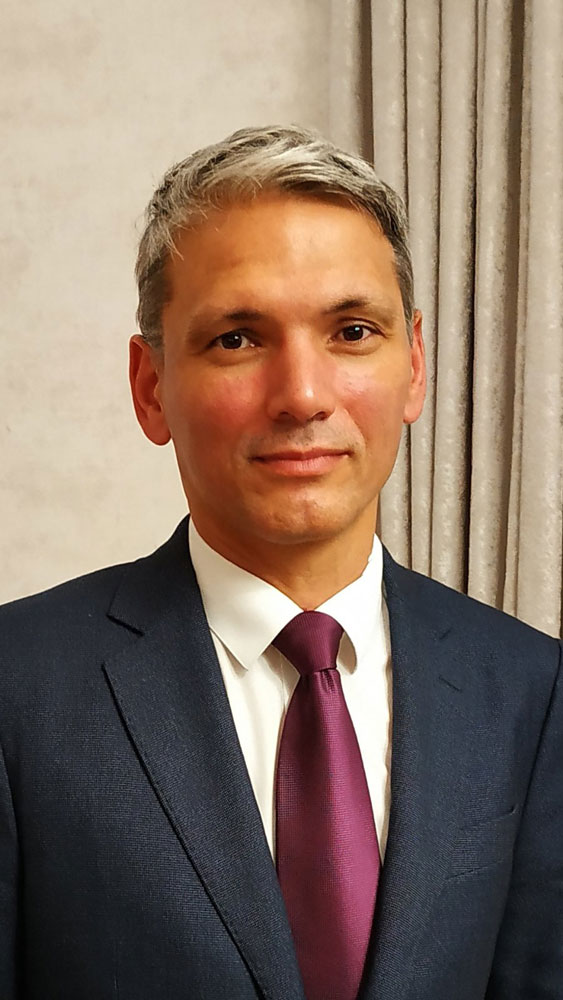

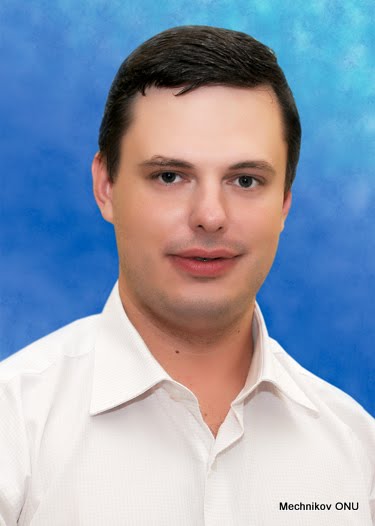
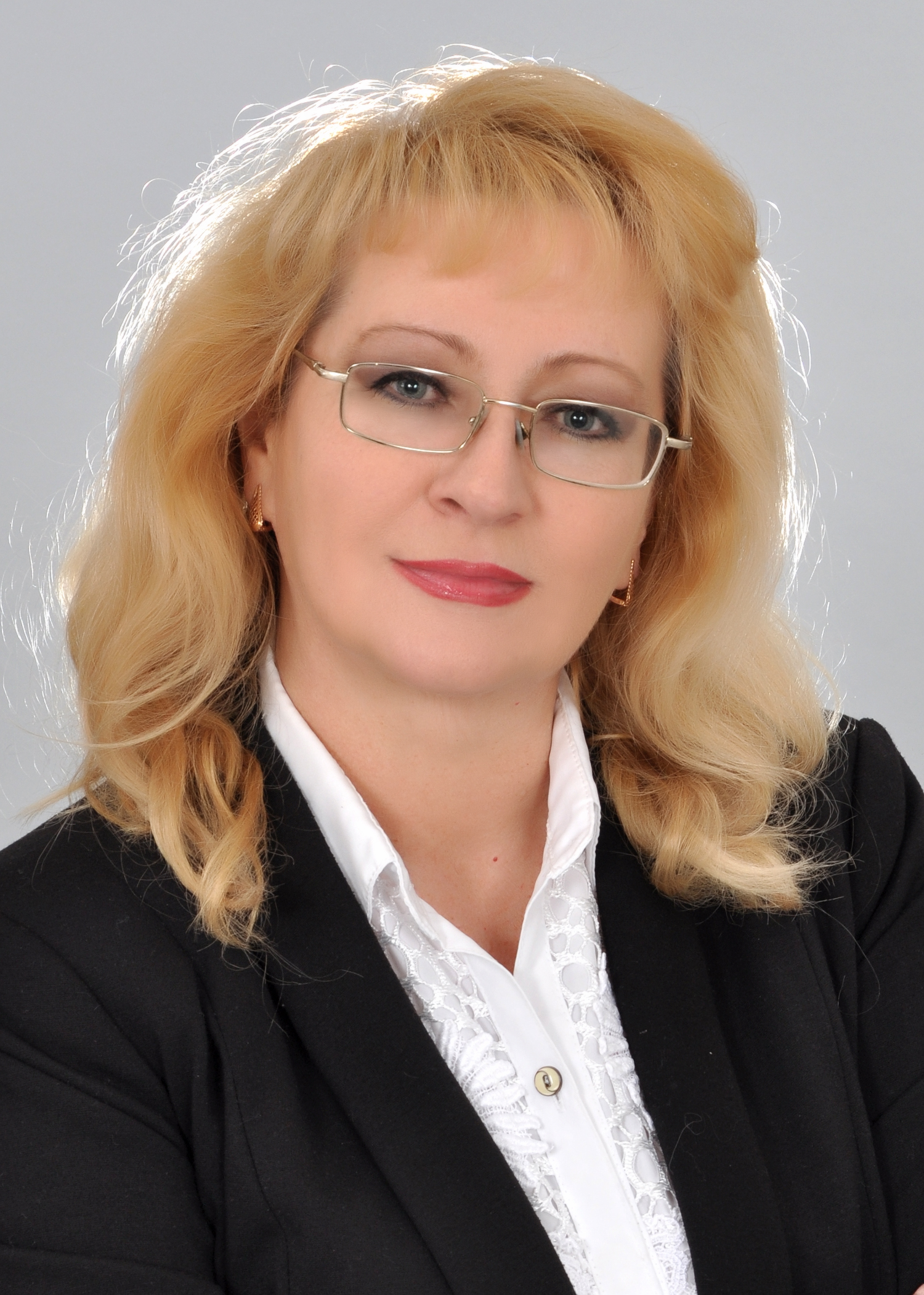
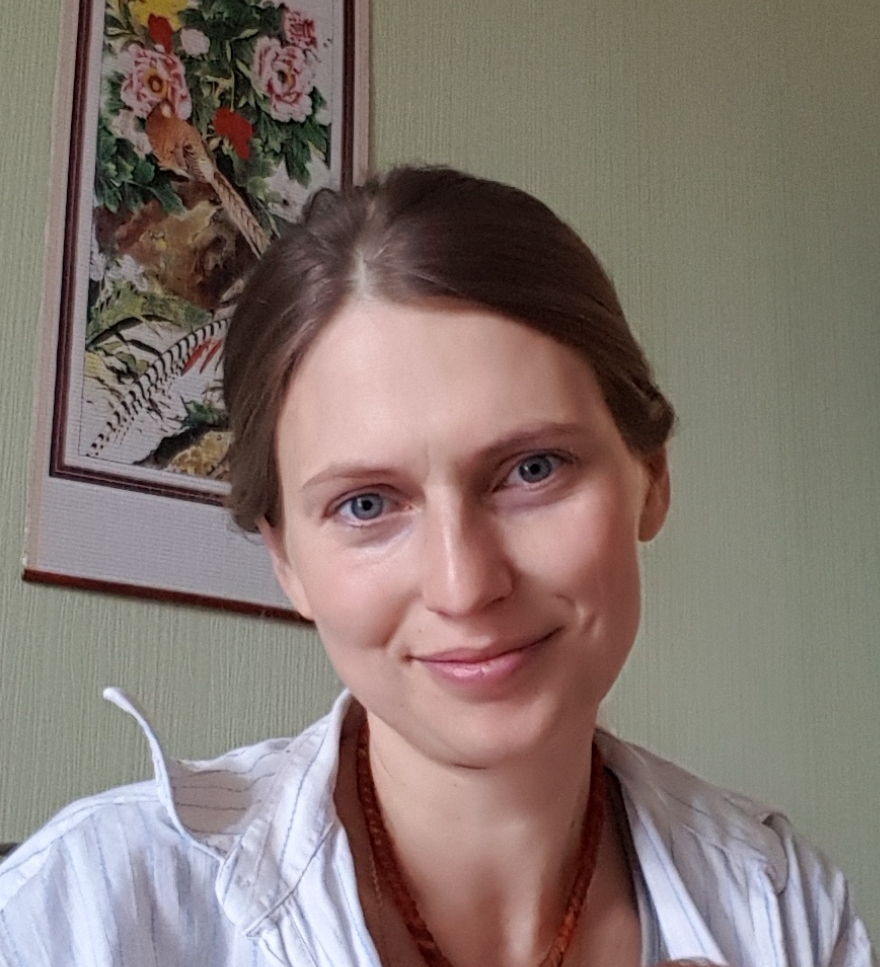 Academic degree Doctor in Economics
Academic degree Doctor in Economics